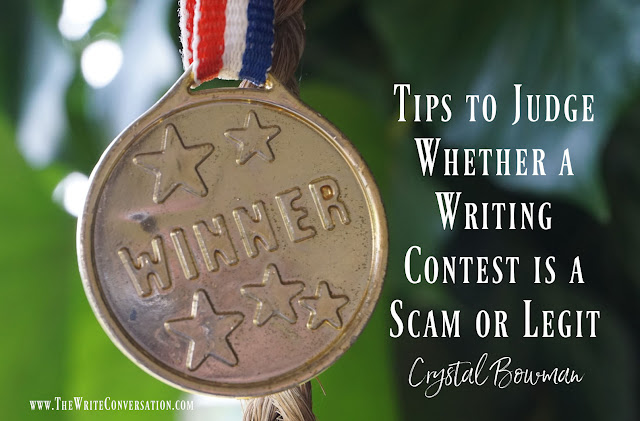Many decades ago, when I first started writing in hopes of getting published, I entered one of my children’s poems in a contest. I was beyond excited when I received a letter congratulating me for placing fourth in the children’s category. I was invited to attend a weekend conference in New York so I could receive my trophy at the awards ceremony on the final day.
My mind raced with anticipation as I picture myself at this conference with the bigwigs in publishing. But when I added up the cost of conference, hotel, and airfare, my excitement quickly diminished. I also discovered that there were dozens of fourth place winners, thrid place winners, second place winners, and who-knows-how-many first place winners! Though the conference was probably legit, the contest was a scam to get writers to attend the conference.
In another scenario, a close friend of mine submitted a picture book manuscript to a contest. The guidelines were very specific, and she followed them exactly. The prize for first place, which she won, was a royalty contract with a reputable publisher. Having her first book published as a result of the contest launched her writing career.
So how do you know if a contest is a scam or an opportunity to get your work noticed and possible published?
Do your homework and consider these tips:
- If it sounds too good to be true, it probably is. If the grand prize is million-dollar contract and a trip to the Virgin Islands, don’t fall for the scam.
- If the cost to submit your work is unreasonable or unaffordable to you, pass.
- If you don’t recognize the name of the publisher or organization and cannot find it by doing a google search, pass.
- If the magazine or book publisher is one you recognize, or easily located online, consider submitting your work.
- A call for manuscripts or stories is not the same as a contest. It’s an open opportunity for you to submit your work to a magazine or compilation book such as Chicken Soup for the Soul. If your story is accepted, it will be included in an upcoming publication. Chicken Soup for the Soul pays $200 plus 10 free copies to the author.
- Before you submit your work to a contest or call for manuscripts, be sure to read the fine print to find out if you retain the rights or if the publisher will own the rights. With some magazines, the rights revert back to the author six months after publication, but that is not always the case.
The bottom line:
There are numerous opportunities for writers to submit their manuscripts to contests. The contests may be legit, or they may be a scam. The bottom line is to do your homework and gain as much information as you can before getting your hopes up too high! I’m glad I didn’t spend $1500 to fly to New York to receive a $10 trophy, even though I was a fourth place winner!
TWEETABLE
Crystal Bowman is an award-winning, bestselling author of more than 100 books for children and four nonfiction books for women. She also writes lyrics for children’s piano music and is a monthly contributor to Clubhouse Jr. Magazine. She loves going to schools to teach kids about poetry. She also speaks at MOPS (Mothers of Preschoolers) groups and teaches workshops at writers’ conferences. When she is not writing or speaking, she enjoys going for walks, working out at the gym, and eating ice cream. She and her husband live in Michigan and have seven huggable grandkids.


Thanks for this, Crystal. There are so many people trying to make a profit off anxious authors. This is just another example. Wise words.
ReplyDeleteThanks, Julie. I hope it helps a few people avoid falling for a scam.
ReplyDeleteYes, there are scams out there. I received an invitation to go to a conference in Las Vegas. At the time, I could not afford a trip like that. Thank you for the pointers.
ReplyDelete